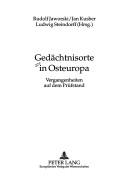| Listing 1 - 10 of 28 | << page >> |
Sort by
|
Book
ISBN: 3515085521 Year: 2004 Publisher: Stuttgart Steiner
Abstract | Keywords | Export | Availability | Bookmark
 Loading...
Loading...Choose an application
- Reference Manager
- EndNote
- RefWorks (Direct export to RefWorks)
Book
ISBN: 3631306369 Year: 1997 Publisher: Berlin ; Bern ; Paris Peter Lang
Abstract | Keywords | Export | Availability | Bookmark
 Loading...
Loading...Choose an application
- Reference Manager
- EndNote
- RefWorks (Direct export to RefWorks)
Book
ISBN: 9783525101551 3525101554 Year: 2017 Volume: 115 Publisher: Göttingen Vandenhoeck & Ruprecht
Abstract | Keywords | Export | Availability | Bookmark
 Loading...
Loading...Choose an application
- Reference Manager
- EndNote
- RefWorks (Direct export to RefWorks)
Religion and politics --- Europe --- European Union countries --- Church history --- Religion --- 341.17 EU --- 341.17 EU Europese Unie--vv {341.17 EC} vanaf 1995--EU --- Europese Unie--vv {341.17 EC} vanaf 1995--EU --- Religion and politics - European Union countries --- Europe - Church history - 20th century --- European Union countries - Religion - 20th century
Book
ISBN: 3666101550 3647101559 Year: 2017 Publisher: Göttingen, [Germany] : Vandenhoeck & Ruprecht,
Abstract | Keywords | Export | Availability | Bookmark
 Loading...
Loading...Choose an application
- Reference Manager
- EndNote
- RefWorks (Direct export to RefWorks)
Religion and politics --- European Union countries. --- Europe --- European Union countries --- Church history --- Religion --- Political science --- Politics, Practical --- Politics and religion --- Religions --- Religious aspects --- Political aspects --- EU countries --- Euroland
Book
ISBN: 3525560435 9783525560433 Year: 2020 Publisher: Göttingen: Vandenhoeck und Ruprecht,
Abstract | Keywords | Export | Availability | Bookmark
 Loading...
Loading...Choose an application
- Reference Manager
- EndNote
- RefWorks (Direct export to RefWorks)
Book
ISBN: 1282949624 9786612949623 904742915X Year: 2009 Publisher: Leiden [Netherlands] ; Boston : Brill,
Abstract | Keywords | Export | Availability | Bookmark
 Loading...
Loading...Choose an application
- Reference Manager
- EndNote
- RefWorks (Direct export to RefWorks)
Historians habitually write about empires that expand, wage wars, and collapse, as if empires were self-evident and self-conscious entities with a distinct and clear sense of purpose. The stories of empires are told in the language of modern nation-centred social sciences: multi-cultural and heterogeneous empires of the past appear either as huge “nations” with a common language, culture, and territory, or as amalgamations of would-be nations striving to gain independence. Empire Speaks Out reconstructs the historical encounter of the Russian Empire of the seventeenth through the early twentieth centuries with the complex challenge of modernity. It does so by taking the self-awareness of empire seriously, and by looking into how bureaucrats, ideologues, politicians, scholars, and modern professionals described the ethnic, cultural, and social diversity of the empire. “Empire” then reveals itself not through deliberate and well-conceived actions of some mysterious political body, but as a series of “imperial situations” that different people encounter and perceive in common categories. The rationalization of previously intuitive social practices as imperial languages is the central theme of the collection. This book is published with support from Volkswagen Foundation, within the collective research project “Languages of Self Description and Representation in the Russian Empire”
Cultural pluralism --- Imperialism --- Rationalization (Psychology) --- Self-perception --- Language and culture --- Discourse analysis --- History. --- Social aspects --- Political aspects --- Russia --- Ethnic relations. --- Social conditions. --- Politics and government. --- History

ISBN: 3631506813 Year: 2003 Publisher: Frankfurt am Main Lang
Abstract | Keywords | Export | Availability | Bookmark
 Loading...
Loading...Choose an application
- Reference Manager
- EndNote
- RefWorks (Direct export to RefWorks)
Book
ISBN: 9783706549622 Year: 2011 Publisher: Innsbruck StudienVerlag
Abstract | Keywords | Export | Availability | Bookmark
 Loading...
Loading...Choose an application
- Reference Manager
- EndNote
- RefWorks (Direct export to RefWorks)
Book
ISBN: 3839443555 9783839443552 Year: 2020 Publisher: Bielefeld
Abstract | Keywords | Export | Availability | Bookmark
 Loading...
Loading...Choose an application
- Reference Manager
- EndNote
- RefWorks (Direct export to RefWorks)
Zwei der berühmtesten Herrscherpersönlichkeiten des 18. Jahrhunderts waren Frauen: Maria Theresia von Österreich und Katharina II., die Große, von Russland. Auf den ersten Blick waren sie denkbar unterschiedlich - hier die zwar partiell reformbereite, aber an traditionellen Legitimationsansätzen monarchischer Herrschaft festhaltende Habsburgerin, dort die dezidiert aufklärerische geborene Prinzessin von Anhalt-Zerbst. Der Band nimmt erstmals die beiden Kaiserinnen vergleichend in den Blick und zeigt, dass sie sich in einigen Bereichen mit durchaus ähnlichen Herausforderungen konfrontiert sahen und dass ihre Lösungsansätze bei allen Differenzen auch manche Gemeinsamkeiten aufwiesen.
Women heads of state. --- Catherine --- Maria Theresa, --- Europe --- Politics and government --- Biography Comparison. --- Catherine the Great. --- Cultural History. --- Enlightenment. --- Female Rule. --- Gender History. --- Gender Studies. --- Gender. --- History. --- Monarchy.
Book
ISBN: 9783948465506 3948465509 Year: 2020 Publisher: Heidelberg Propylaeum
Abstract | Keywords | Export | Availability | Bookmark
 Loading...
Loading...Choose an application
- Reference Manager
- EndNote
- RefWorks (Direct export to RefWorks)
Byzantine Empire --- Civilization. --- Nachleben im Mittelalter --- Byzantinische Geschichte
| Listing 1 - 10 of 28 | << page >> |
Sort by
|

 Search
Search Feedback
Feedback About UniCat
About UniCat  Help
Help News
News